In short...
Themes: celebrating St George's Day; the life of St George; customs associated with St George's Day; saints.
Summary: This assembly celebrates St George's Day, which falls on 23 April each year. The video animation considers what we know about the real St George and explores how a Roman soldier who lived 2000 years ago became revered throughout Europe and beyond. The assembly is particularly suitable in the days preceding St George's Day, or used in conjunction with our other content exploring the patron saints of the UK.
Resources: The , an and a map showing European towns and countries .

The video
ST GEORGE'S DAY
On the 23 April people across England celebrate St George's day.
St George is the patron saint of England, but what do we really know about him?
Well, according to the legend, he was brave, he wore a suit of armour and rode a horse. He fought a mighty dragon, to save a princess who was in trouble.
The story of St George is a popular one. Itās been told for at least 1600 years, and over that time it's changed a bit. Well, a lot, actually. For example, the whole 'rescuing the princess' bit, may well have been 'borrowed' from the story of Perseus, who rescued Princess Andromeda from a sea monster, which is actually an Ancient Greek myth.
Itās believed St George was a real person, but he wasn't English. He probably came from a place called Cappadocia, in modern-day Turkey. And instead of being a knight, he was a Roman soldier, at the time of Emperor Diocletian in the 4th century.
And this was when the real story began.
Diocletian believed in the Roman gods and wanted Christians to worship them as well. When they refused Diocletian was very angry. He ordered his soldiers to set churches on fire and throw priests in prison.
Although he was a Roman soldier, George was also a Christian and very brave. He spoke out against Diocletian and his reign of terror and even when he was sentenced to death George stayed true to his faith.
When someone dies for their beliefs theyāre called a āmartyrā.
Over 200 years later Pope Gelasius, head of the Christian church, decided George should be made a saint. This is a great honour, as only the most virtuous and holy people are chosen to become saints.
After George died, his body was taken to a city called Lydda, which is now called Lod, in modern-day Israel. There, a church was built and named after him, and his remains were buried in it.
Well, most of them were.
It was common at the time for bits of saints or their belongings to be removed and given to churches across the Christian world. These were called ārelicsā and were often kept in containers, made of gold and precious stones, called a āreliquaryā.
People believed that the relics gave them a special connection to the saint or could be used to perform miracles. In fact, Windsor Castle is said to have once held two of St George's fingers and bits of his skull and heart.
In the centuries following his death St George appeared in many paintings and books, which is where all the extra bits of the story have been added in. One of the best-known stories was included in a collection called āThe Golden Legend' from 1266. In the story St George rescues a king's daughter from a dragon and in return the people agree to be baptised and become Christian.
St Georgeās legendary bravery led to English kings and their armies flying the flag of St George, while wearing a red cross on a white background also showed their Christian faith. In the 14th century King Edward III of England made St George the Patron Saint of The Noble Order of the Garter, who were a group of important knights. And thatās when St George became the patron saint of England.
St George isnāt just patron saint of England though, heās also patron saint of Portugal and Georgia as well as a number of cities. His red cross is shown not once but five times on the flag of Georgia. Heās even pictured slaying the dragon on the Russian coat of arms.
The red cross of St George also appears on the āUnion Jackā, or āUnion Flagā to give it its proper name. It combines the flag of St Patrick for Ireland, and St Andrew for Scotland, together with Englandās Cross of St George.
So, as you can see, St George is a pretty popular saint, not just in England but in many other places too.
Well, if you were a legend known for extreme bravery and awesome dragon-slaying skills, youād be pretty popular too!
St George's Day is celebrated throughout England on 23 April. But what do we know about the real St Georgeā¦?
It is believed George lived in the 4th Century in a region of modern-day Turkey and was a soldier in the Roman army. Although he was a Roman soldier George was also a Christian. He spoke out against the persecution of Christians by the Emperor Diocletian - for which he was executed.
About 200 years after his death George was canonised - he was made Saint George - and thereafter he became the subject of a number of popular stories, such as the well-known one about rescuing a princess from a dragon.
King Edward III of England adopted St George as the patron saint of The Noble Order of the Garter, leading to St George becoming the patron saint of England. But St George is also recognised by many other cities and countries throughout Europe and beyond.
Duration: 4' 29:
End of speech: 'ā¦you'd be pretty popular too!'
Video questions
- For how many years have stories about St George been told? (About 1600 years)
- What job did George have? (He was a soldier in the Roman army)
- Why was George executed? (He spoke out against the persecution of Christians by Emperor Diocletian)
- What is a 'martyr'? (Someone who dies for their beliefs)
- What is a 'relic'? (Part of the remains of a saint, or perhaps a fragment of their possessions)
- What countries is St George the patron saint of? (England, Portugal, Georgia)
- What flags does the Union Flag combine? (Cross of St Patrick, Cross of St Andrew, Cross of St George)

Key links
Download / print the assembly framework ready for use
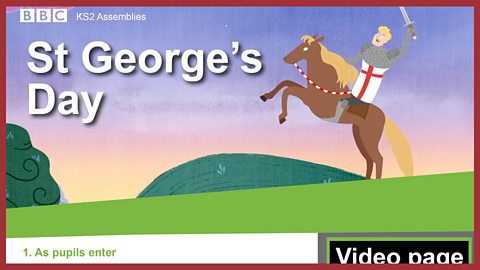
Click to display the image full-size
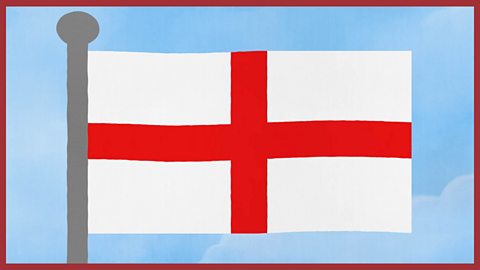
Click to display the image full-size
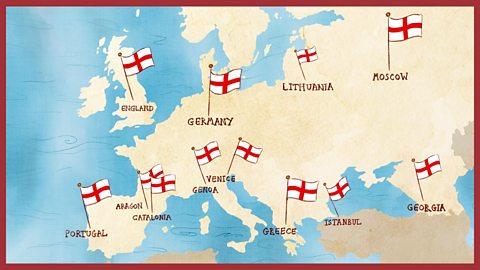

Suggested framework
1. Entry
Play your chosen music and display a focus image if desired (see Key links, above).
2. Introduction
Begin by asking some questions about St George:
- Who can tell me who the patron saint of England is?
- Do you think St George was a real person? Why? Why not?
- Do you know any famous stories about St George?
- There is a famous story that St George fought with a dragon. Do you think that story is true?
- How do you think the story of St George fighting a dragon came to exist?
Explain that now the assembly is going to watch a short video about St George, which will include what we know about the real St George.
3. Play the video
The duration is 4' 29" and the final words are: 'ā¦you'd be pretty popular too!'
4. After the video - time to talk
You could ask some of the Video questions to consolidate pupils' recall and understanding of the film.
Focus pupils' thoughts on the courage George had to show to stand up for what he believed - even if it meant death:
- Why was George martyred? (Because he spoke out against the persecution of Christians)
- Do you think what George did - speaking out against the Roman Emperor - would have been easy?
- *Has there been a time in your own life when you've had to stand up for what you believe - even though it was hard to do so? *(Share responses).
5. Opportunity to sing
An appropriate moment to sing your chosen song. Suggestions from “óĻó“«Ć½ collections below.
6. Opportunity to reflect
Focus your reflection on the courage of St George:
Be quiet now and listen carefully as we think about St Georgeā¦
Today we've heard about two St Georgesā¦one the St George of stories, who fights with a dragonā¦
And the other, the real St George, a soldier in the Roman army about 1600 years agoā¦
The real St George witnessed things he knew to be wrongā¦so he spoke out against themā¦
Even when that meant speaking out against the Roman Emperorā¦and certain deathā¦
Today we think of St George as brave and courageousā¦but his courage wasn't fighting with a dragon, it was standing up for the truthā¦
Think quietly now about a time when you've had to show courageā¦even though it wasn't easy to do soā¦
7. Opportunity for prayer
Begin with your usual form of address ('Dear God' / 'Let us pray'/ etc) and:
We thank you for the life of St George and the other saintsā¦
Help us to remember the courage he showed and the example that he setā¦
Help us all to stand up for the truth and the things we know to be right.
Amen.

Suggested songs
'He who would valiant be' (Come and Praise, no 44)
He who would valiant be
'Gainst all disaster,
Let him in constancy
Follow the Master.
There's no discouragement
Shall make him once relent
His first avowed intent
To be a pilgrim.
Who so beset him round
With dismal stories,
Do but themselves confound -
His strength the more is.
No foes shall stay his might,
Though he with giants fight:
He will make good his right
To be a pilgrim.
Since, Lord, thou dost defend
Us with thy Spirit,
We know we at the end
Shall life inherit.
Then fancies flee away!
I'll fear not what men say,
I'll labour night and day
To be a pilgrim.
Song: 'Give me oil in my lamp' (Come and Praise, no 43. Vocal version)
- Give me oil in my lamp, keep me burning.
Give me oil in my lamp, I pray.
Give me oil in my lamp, keep me burning,
Keep me burning till the break of day.
ChorusSing hosanna, sing hosanna,
Sing hosanna to the King of Kings!
Sing hosanna, sing hosanna,
Sing hosanna to the King!
- Give me joy in my heart, keep me singing.
Give me joy in my heart, I pray.
Give me joy in my heart, keep me singing,
Keep me singing till the break of day.
Chorus
- Give me love in my heart, keep me serving.
Give me love in my heart, I pray.
Give me love in my heart, keep me serving,
Keep me serving till the break of day.
Chorus
- Give me peace in my heart, keep me resting.
Give me peace in my heart, I pray.
Give me peace in my heart, keep me resting,
Keep me resting till the break of day.
Chorus
'God is watching over you' (All about our school, no 7)
God is watching over you,
When you lay down to sleep,
When you wake he will keep
Always watching over you,
Now and forever more.God is watching over you,
When you lay down to sleep,
When you wake he will keep
Always watching over you,
Now and forever more.
Now and forever more.

Related links
Video: What is a saint? - children offer their views on what a saint is (“óĻó“«Ć½ Teach)
Audio: The story of St George - an audio story based on what we know of St George's life (“óĻó“«Ć½ Teach)

Other assemblies about patron saints
St Patrick's Day. collection
KS1 / KS2. Celebrating St Patrick's Day; the life of St Patrick; showing courage and determination.
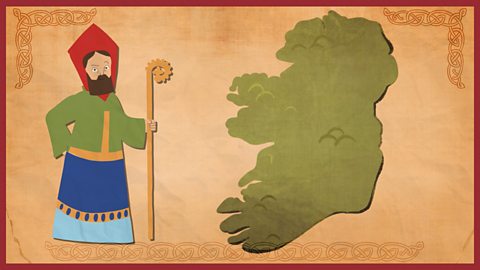
St David's Day. collection
KS1/KS2. Celebrating St David's Day (1 March); patron saints; the life of St David; devotion.
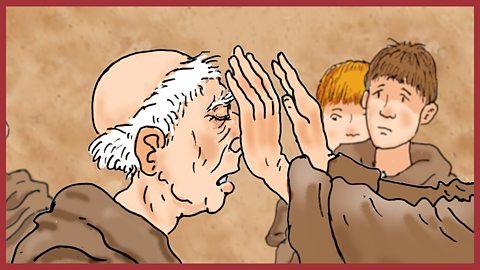
St Andrew's Day. collection
KS1. Celebrating St Andrew's Day (30 November); patron saints; celebrating special days.

